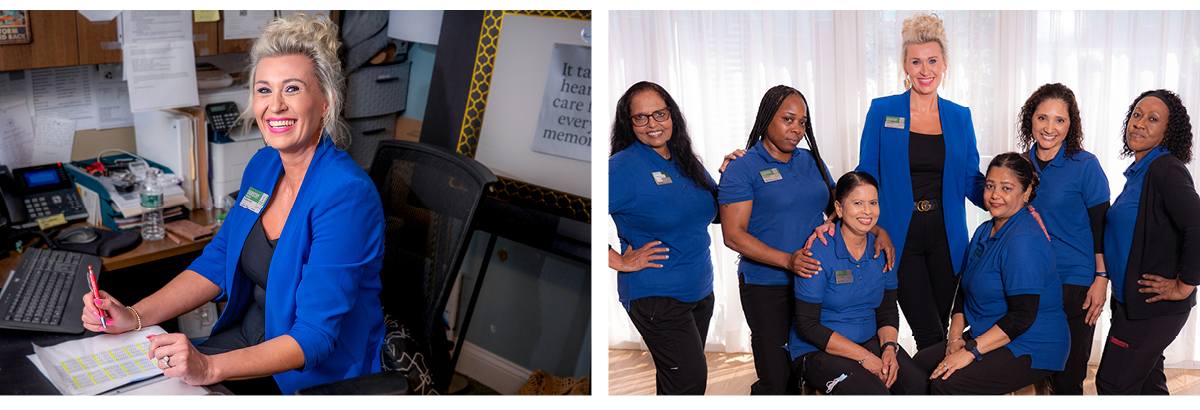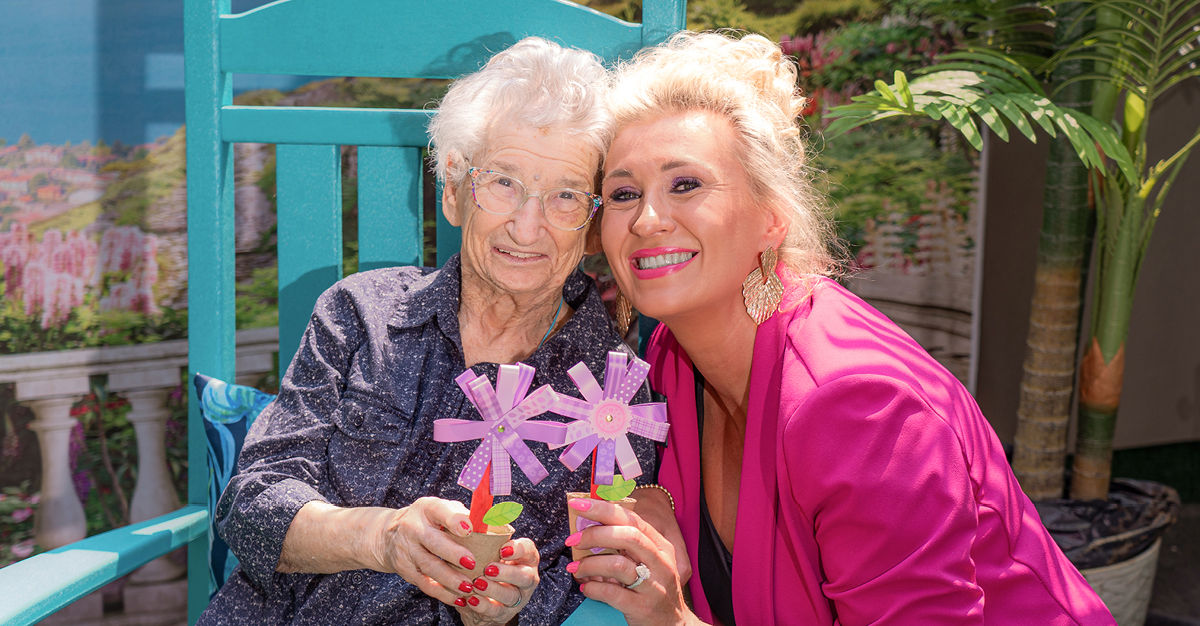Summary
Can memory care truly preserve joy for someone with Alzheimer’s or other forms of dementia? Dorothy Obrycka’s innovative approach at Atria Park of Lynbrook proves exceptional care goes far beyond basic safety to create meaningful connections and accomplishment.
Dorothy Obrycka never expected a volunteer experience to transform her life. The former fashion stylist from Warsaw was helping out at a nearby senior living community when someone asked her to assist with memory care. “Once I stepped in to help with the people living with memory loss, that was it,” she recalls. “Sometimes you walk into something, and you just know you belong.”
With over 7.2 million Americans age 65 and older currently living with Alzheimer’s disease – a number projected to reach nearly 13 million by 2050* – families across the country are searching for memory care that goes beyond basic safety to preserve dignity and joy.
Today, as Life Guidance Director at Atria Park of Lynbrook, Dorothy’s journey illustrates what separates exceptional memory care from the ordinary, and why her approach has earned 25 heartfelt letters from families who found hope in the most challenging circumstances.
What is memory care?
Memory care is specialized senior living designed specifically for individuals with Alzheimer’s disease and other forms of dementia. Unlike traditional independent and assisted living, these communities feature secure environments with staff trained in dementia care techniques, structured daily routines and specialized programs that addresses the unique challenges of cognitive decline.
The key difference lies in the approach. Quality memory care goes beyond basic safety measures to create environments where residents can still experience joy, accomplishment and meaningful connections despite their diagnosis.
What makes the best memory care communities exceptional?
The best memory care communities share three essential qualities that Dorothy has perfected at Atria Park of Lynbrook.
Personalized programs
Rather than basic or overly simplified activities, Dorothy’s residents use regular-sized golf equipment and play competitive ping-pong. “The first day we tried it, nobody knew how to play,” she says. “Two days later, we had five residents playing – and they were really great at it! It’s muscle memory.”
For residents who need more support, there’s “Baby Atriana” – a realistic newborn doll that helps establish daily routines through therapeutic doll therapy. “They feed her, burp her, put her to sleep…” Dorothy explains. This type of therapy can reduce anxiety and agitation while providing comfort and purpose.

Comprehensive staff education
Dorothy’s office wall displays certifications and courses her team can pursue. Her staff receives training not just from Atria, but also from the Alzheimer’s Association every few months. They learn specialized techniques for dementia care, communicating with families and remaining calm during stressful situations.
“I always tell my staff, ‘Be proud of where you work. You have the best training in senior living.’”
Genuine family support systems
Dorothy personally called every family when she started at Lynbrook, making herself available 24/7. Her monthly wine and cheese nights aren’t just social gatherings – they’re educational opportunities where families learn from Alzheimer’s Association experts while connecting with each other.
“When one family says to another, ‘Hey, how are you? How’s your mom?’ – that’s when you know you’ve built a strong sense of community,” Dorothy observes. These connections often extend beyond the walls of the community, with families supporting each other through shared experiences.
Memory care: Finding the right fit
When evaluating memory care communities, Dorothy’s approach at Atria Park of Lynbrook demonstrates what to look for. Her philosophy of going above and beyond – setting the bar higher than standard expectations – shows in every detail.
Families touring Lynbrook see shadow boxes that are more elaborate than typical memory care communities. Dorothy takes a hands-on approach with everyone she meets. “A lot of families just need directions,” she says. “I always tell them, ‘Listen, you will be fine. I will guide you every step of the way.’”
Location matters, but the right leadership makes all the difference. Dorothy times move-ins for the days she’s on-site – Sunday through Thursday – so she can personally guide each new resident through their first steps.
Understanding memory care costs and options
While memory care represents a significant investment, families should know that many insurance plans and long-term care policies provide coverage. Dorothy works closely with families to explore financial options and connect them with resources that can help make quality care accessible.
Even if Atria isn’t the right financial fit for your family, Dorothy and her team believe everyone deserves access to quality memory care guidance. She regularly refers families to other reputable memory care communities, adult day programs and in-home care services that may better match their budget. The Alzheimer’s Association also offers free resources and can help connect families with local support services, regardless of where they choose to receive care.
The power of going beyond expectations
Dorothy brings a sense of grace and hospitality to memory care. She stands to greet families as they enter her office, sets elegant atmospheres with candles and flowers during gatherings, and leads beach trips that show what’s possible with creativity and teamwork.
“We hold our residents’ lives in our hands,” Dorothy says. “If we choose to make their day great and safe, that’s the day they will have.”
This philosophy extends throughout Atria’s memory care communities across the U.S., where specialized care meets innovative programs, staff education never stops and families become part of an extended support network.
Frequently asked questions
What’s the difference between memory care and assisted living?
Memory care provides specialized support for cognitive challenges with secure environments, dementia-trained staff and programs designed to reduce confusion. Assisted living focuses on help with daily activities like bathing and medications for those who don’t have significant cognitive impairment.
How do I know when it’s time for memory care?
Signs include increased confusion about time and place, difficulty with daily tasks, wandering and safety concerns at home.
What should I look for during a tour?
Observe staff interactions with residents, ask about staff training, review activity calendars and assess the overall atmosphere and cleanliness.
How can I help my family member adjust?
Bring familiar items, maintain regular visit schedules and work with staff to share their preferences and routines.
Help them thrive again
Just like Dorothy rediscovered her spark through Atria’s personalized memory care, the person you love can too. Find an Atria community and see the difference exceptional care makes.
*Alzheimer’s Association. (2025). 2025 Alzheimer’s Disease Facts and Figures. Alzheimer’s & Dementia, 2025;7(2). Retrieved from https://www.alz.org/alzheimers-dementia/facts-figures
You might also like
Want to learn more about life at Atria Senior Living?


